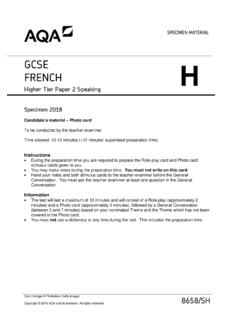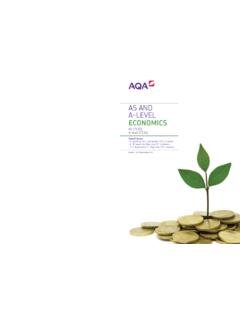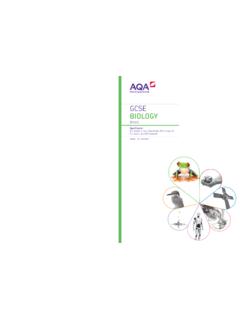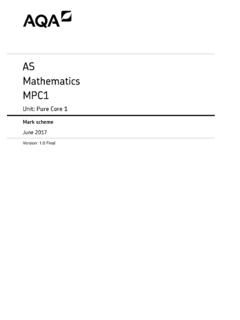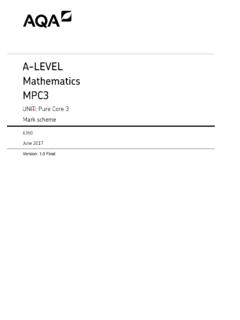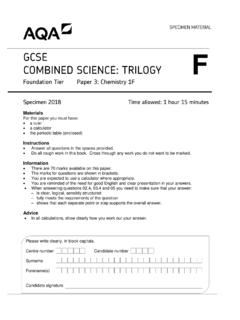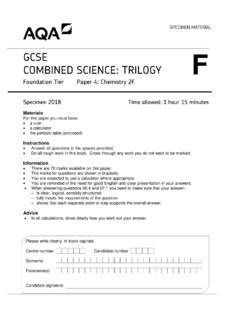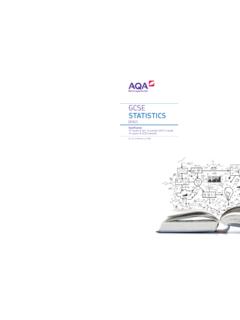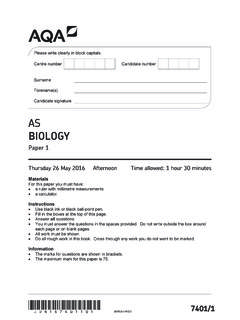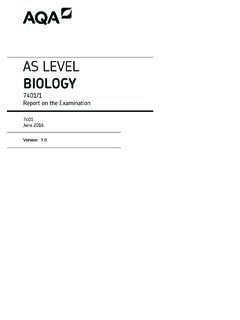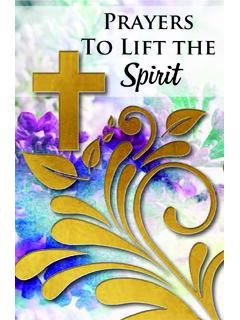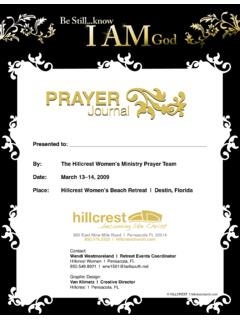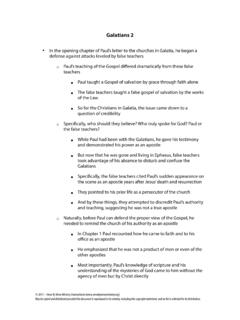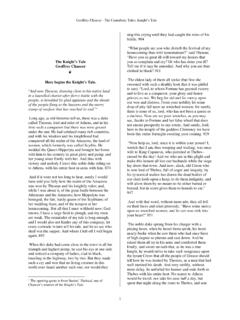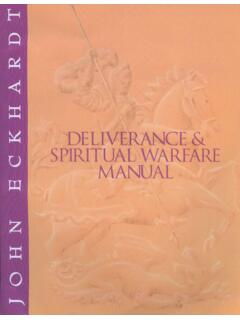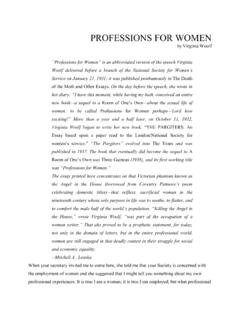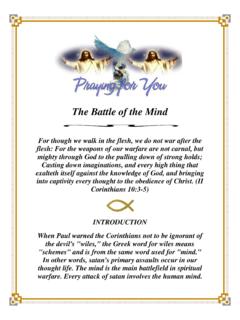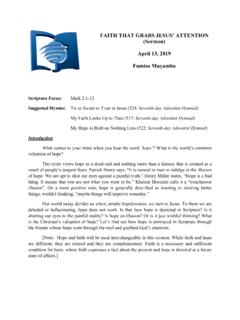Transcription of Paper 1 Shakespeare and the 19th-century novel
1 GCSE. ENGLISH LITERATURE. Paper 1 Shakespeare and the 19th-century novel Wednesday 13 May 2020 Morning Time allowed: 1 hour 45 minutes Materials For this Paper you must have: an AQA 16-page Answer Book. Instructions Use black ink or black ball-point pen. Do not use pencil. Write the information required on the front of your answer book. The Paper Reference is 8702/1. Answer one question from Section A and one question from Section B. You must not use a dictionary. Information The marks for questions are shown in brackets. The maximum mark for this Paper is 64. AO4 will be assessed in Section A. There are 4 marks available for AO4 in Section A in addition to 30 marks for answering the question. AO4 assesses the following skills: use a range of vocabulary and sentence structures for clarity, purpose and effect, with accurate spelling and punctuation. There are 30 marks for Section B. IB/M/Jun20/E8 8702/1. 2.
2 There are no questions printed on this page IB/M/Jun20/8702/1. 3. SECTION A. Shakespeare Question Page Macbeth 1 4 5. Romeo and Juliet 2 6. The Tempest 3 7. The Merchant of Venice 4 8. Much Ado About Nothing 5 9. Julius Caesar 6 10. SECTION B. The 19th-century novel Question Page Robert Louis Stevenson The Strange Case of Dr. Jekyll 7 12 13. and Mr. Hyde Charles Dickens A Christmas Carol 8 14. Charles Dickens Great Expectations 9 16 17. Charlotte Bront Jane Eyre 10 18 19. Mary Shelley Frankenstein 11 20 21. Jane Austen Pride and Prejudice 12 22 23. Arthur Conan Doyle The Sign of Four 13 24. Turn over for Section A. Turn over . IB/M/Jun20/8702/1. 4. Section A: Shakespeare Answer one question from this section on your chosen text. Either 0 1 Macbeth Read the following extract from Act 5 Scene 1 of Macbeth and then answer the question that follows. At this point in the play, the Doctor and the Gentlewoman watch Lady Macbeth sleepwalking.
3 LADY MACBETH Out, damned spot! Out, I say! One, two. Why then 'tis time to do't. Hell is murky. Fie, my lord, fie, a soldier, and afeard? What need we fear who knows it, when none can call our power to account? Yet who would have thought the old 5 man to have had so much blood in him? DOCTOR Do you mark that? LADY MACBETH The Thane of Fife had a wife. Where is she now? What, will these hands ne'er be clean? No more o'that, my Lord, no more o'that. You mar all with this starting. 10 DOCTOR Go to, go to; you have known what you should not. GENTLEWOMAN She has spoke what she should not, I am sure of that. Heaven knows what she has known. LADY MACBETH Here's the smell of the blood still; all the perfumes of Arabia will not sweeten this little hand. O, O, O. 15 DOCTOR What a sigh is there! The heart is sorely charged. GENTLEWOMAN I would not have such a heart in my bosom for the dignity of the whole body. DOCTOR Well, well, well.
4 GENTLEWOMAN Pray God it be, sir. 20 DOCTOR This disease is beyond my practice; yet I have known those which have walked in their sleep who have died holily in their beds. LADY MACBETH Wash your hands, put on your night-gown, look not so pale. I tell you yet again, Banquo's buried; he cannot 25 come out on's grave. DOCTOR Even so? LADY MACBETH To bed, to bed; there's knocking at the gate. Come, come, come, come, give me your hand; what's done cannot be undone. To bed, to bed, to bed. IB/M/Jun20/8702/1. 5. 0 1 Lady Macbeth is a female character who changes during the play.'. Starting with this moment in the play, explore how far you agree with this view. Write about: how Shakespeare presents Lady Macbeth in this extract how far Shakespeare presents Lady Macbeth as a female character who changes in the play as a whole. [30 marks]. AO4 [4 marks]. Turn over for the next question Turn over . IB/M/Jun20/8702/1.
5 6. or 0 2 Romeo and Juliet Read the following extract from Act 1 Scene 1 of Romeo and Juliet and then answer the question that follows. At this point in the play, the Prince has arrived to stop the fight that has broken out in the centre of Verona. PRINCE Rebellious subjects, enemies to peace, Profaners of this neighbour-stain d steel . Will they not hear? What ho, you men, you beasts! That quench the fire of your pernicious rage 5 With purple fountains issuing from your veins: On pain of torture, from those bloody hands Throw your mistempered weapons to the ground, And hear the sentence of your mov d prince. Three civil brawls, bred of an airy word, 10 By thee, old Capulet, and Montague, Have thrice disturbed the quiet of our streets, And made Verona's ancient citizens Cast by their grave beseeming ornaments To wield old partisans, in hands as old, 15 Cankered with peace, to part your cankered hate;. If ever you disturb our streets again, Your lives shall pay the forfeit of the peace.
6 For this time all the rest depart away: You, Capulet, shall go along with me, 20 And, Montague, come you this afternoon, To know our farther pleasure in this case, To old Free-town, our common judgement-place. Once more, on pain of death, all men depart. 0 2 Starting with this speech, explore how Shakespeare presents the effects of the conflict between the Capulet and Montague families. Write about: how Shakespeare presents the effects of the conflict in this extract how Shakespeare presents the effects of the conflict between the Capulet and Montague families in the play as a whole. [30 marks]. AO4 [4 marks]. IB/M/Jun20/8702/1. 7. or 0 3 The Tempest Read the following extract from Act 5 Scene 1 of The Tempest and then answer the question that follows. At this point in the play, Prospero is preparing to leave the island and return to Milan. PROSPERO Ye elves of hills, brooks, standing lakes, and groves, And ye that on the sands with printless foot Do chase the ebbing Neptune, and do fly him When he comes back; you demi-puppets, that 5 By moon-shine do the green sour ringlets make, Whereof the ewe not bites; and you, whose pastime Is to make midnight mushrooms, that rejoice To hear the solemn curfew; by whose aid.
7 Weak masters though ye be I have bedimmed 10 The noontide sun, called forth the mutinous winds, And 'twixt the green sea and the azured vault Set roaring war. To the dread rattling thunder Have I given fire, and rifted Jove's stout oak With his own bolt; the strong-based promontory 15 Have I made shake, and by the spurs plucked up The pine and cedar; graves at my command Have waked their sleepers, oped, and let 'em forth By my so potent art. But this rough magic I here abjure. And when I have required 20 Some heavenly music which even now I do . To work mine end upon their senses that This airy charm is for, I'll break my staff, Bury it certain fathoms in the earth, And deeper than did ever plummet sound 25 I'll drown my book. 0 3 Starting with this speech, explore how Shakespeare presents ideas about power and control. Write about: how Shakespeare presents ideas about power and control in this speech how Shakespeare presents ideas about power and control in the play as a whole.
8 [30 marks]. AO4 [4 marks]. Turn over . IB/M/Jun20/8702/1. 8. or 0 4 The Merchant of Venice Read the following extract from Act 4 Scene 1 of The Merchant of Venice and then answer the question that follows. At this point in the play, Portia, disguised as Balthasar, a Doctor of Laws, is explaining to Shylock why he should show mercy to Antonio. PORTIA The quality of mercy is not strained, It droppeth as the gentle rain from heaven Upon the place beneath. It is twice blest: It blesseth him that gives, and him that takes. 5 'Tis mightiest in the mightiest, it becomes The thron d monarch better than his crown. His sceptre shows the force of temporal power, The attribute to awe and majesty, Wherein doth sit the dread and fear of kings;. 10 But mercy is above this sceptred sway. It is enthron d in the hearts of kings, It is an attribute to God himself, And earthly power doth then show likest God's When mercy seasons justice.
9 Therefore, Jew, 15 Though justice be thy plea, consider this: That in the course of justice, none of us Should see salvation. We do pray for mercy, And that same prayer doth teach us all to render The deeds of mercy. I have spoke thus much 20 To mitigate the justice of thy plea, Which if thou follow, this strict court of Venice Must needs give sentence 'gainst the merchant there. 0 4 Starting with this speech, explore how Shakespeare presents attitudes to mercy in The Merchant of Venice. Write about: how Shakespeare presents Portia's attitude to mercy in this extract how Shakespeare presents attitudes to mercy in the play as a whole. [30 marks]. AO4 [4 marks]. IB/M/Jun20/8702/1. 9. or 0 5 Much Ado About Nothing Read the following extract from Act 4 Scene 1 of Much Ado About Nothing and then answer the question that follows. At this point in the play, the wedding party has assembled and Hero is being questioned.
10 CLAUDIO What man was he, talked with you yesternight, Out at your window betwixt twelve and one? Now if you are a maid, answer to this. HERO I talked with no man at that hour, my lord. 5 DON PEDRO Why, then are you no maiden. Leonato, I am sorry you must hear: upon mine honour, Myself, my brother, and this griev d count Did see her, hear her, at that hour last night, Talk with a ruffian at her chamber window, 10 Who hath indeed most like a liberal villain, Confessed the vile encounters they have had A thousand times in secret. DON JOHN Fie, fie, they are Not to be named my lord, not to be spoke of, 15 There is not chastity enough in language, Without offence to utter them: thus, pretty lady, I am sorry for thy much misgovernment. CLAUDIO Oh Hero! What a hero hadst thou been, If half thy outward graces had been placed 20 About thy thoughts and counsels of thy heart? But fare thee well, most foul, most fair, farewell Thou pure impiety, and impious purity, For thee I'll lock up all the gates of love, And on my eyelids shall conjecture hang, 25 To turn all beauty into thoughts of harm, And never shall it more be gracious.
